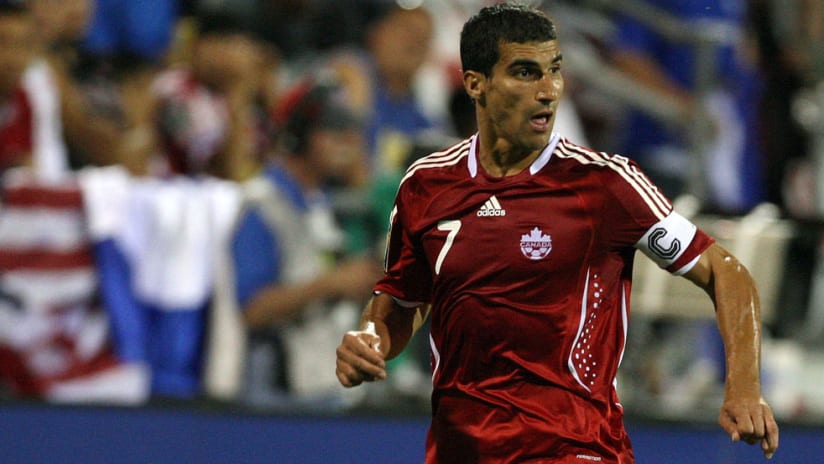As a player, Paul Stalteri helped Canada reach the top of the mountain in CONCACAF. Now, as a coach, he’s hoping to help get the program back there again.
The 38-year-old was named head coach of Canada’s Under-17 national team at the end of January, and he immediately got to work overseeing a youth evaluation camp that’s currently running in Burnaby, British Columbia.
It’s nothing new for Stalteri, who first got involved with the Canadian youth program in 2013, two years after his retirement as a player. That playing career included long stints with Werder Bremen and Tottenham Hotspur, as well as 84 caps for Canada and a continental crown as a member of the 2000 Gold Cup squad.
“When you’re finished playing, you always want to be involved in the sport that’s given you so much,” Stalteri told MLSsoccer.com in a phone interview from Burnaby. “It was an opportunity to come back and participate, work with youth players and give some of my experiences and knowledge back to them.”
Suffice to say, much has changed on the Canadian landscape since Stalteri was rising through the ranks 20 years ago. At that time, the youth national teams rarely held camps; when they did, it was a mad scramble to collect players who were competing for their local clubs across the country, all at varying levels of readiness.
Now, as Stalteri oversees and evaluates a group of 30 players in the U-17 group (some of whom he’s already very familiar with from his previous role as U-15 head coach), it’s like night and day – and there’s one big reason why.
“The biggest difference alone is the professional academies,” said Stalteri. “The longer and longer the professional academies are involved in Canadian football, you’re starting to see more and more players produced at a bigger rate within the clubs.”
It’s not just about quantity, according to Stalteri: Players are coming into national-team camps with greater technical prowess and game awareness than in years past.
And, importantly, youngsters are developing a wider range of skills, transcending the traditional stereotype of Canadian players as one-dimensional, unrefined grinders.
“We’re definitely developing more rounded footballers, more players comfortable on the ball, more creative players,” said Stalteri. “Players that can actually put the ball in the back of the net and wingers that can create things.”
The priority for any youth team is, of course, to help prepare players for the possibility of moving up to the senior side. To that end, Stalteri is working closely with other coaches within Canada’s youth ranks to help ensure a seamless transition for young players making their way to the senior national team.
“The main goal behind us is, how much experience can we get with these players?” said Stalteri. “The more these kids play together, the more they play at the international level, the better prepared they will be when you’re playing with the senior team.”
The senior team is well known, at the moment, for playing a particularly structured game under veteran manager Benito Floro. As for how that trickles down to the youth ranks, Stalteri – who describes Floro as “very tactically astute” – wants to not only prepare players to potentially slot into Floro’s system, but also to have the versatility to excel within the rigors of the CONCACAF region.
“They’ve gained that vital experience, and they know now they can do whatever they’re asked to do, with whatever coach is in that system,” said Stalteri. “The senior team may need to change tactics from game to game; that’s all part of playing in a results-oriented business.”
Few Canadian players have had more success in that results-oriented business than Stalteri has, which would naturally lead many to wonder whether the former national-team captain could, one day, see himself managing the senior team. Stalteri laughs at the suggestion.
“Not in my immediate future,” he said. “I’ve just taken on this role, and I’m looking forward to the next 12 months, hopefully 20 months with this group of players.
“That’s my main focus, getting the most experience out of this group and leading them into what we hope will be a successful qualifying campaign [toward the 2017 FIFA U-17 World Cup].”
Despite missing out on the U-17 World Cup last year, Canada did qualify for the 2011 and 2013 editions, earning results against tough European opponents on both occasions [England in 2011 and Austria in 2013]. Perhaps more importantly, numerous players from those cycles have made the jump to Canada’s senior team.
And while Stalteri’s young charges won’t be in a position to help the senior side on the road to Russia 2018, he’s confident that the youth program is turning out players that could help Canada get back to the sport’s biggest stage.
“There’s no doubt about it,” he said. “Part of the goal for the youth program is to produce players for the senior team to qualify for the World Cup.”














